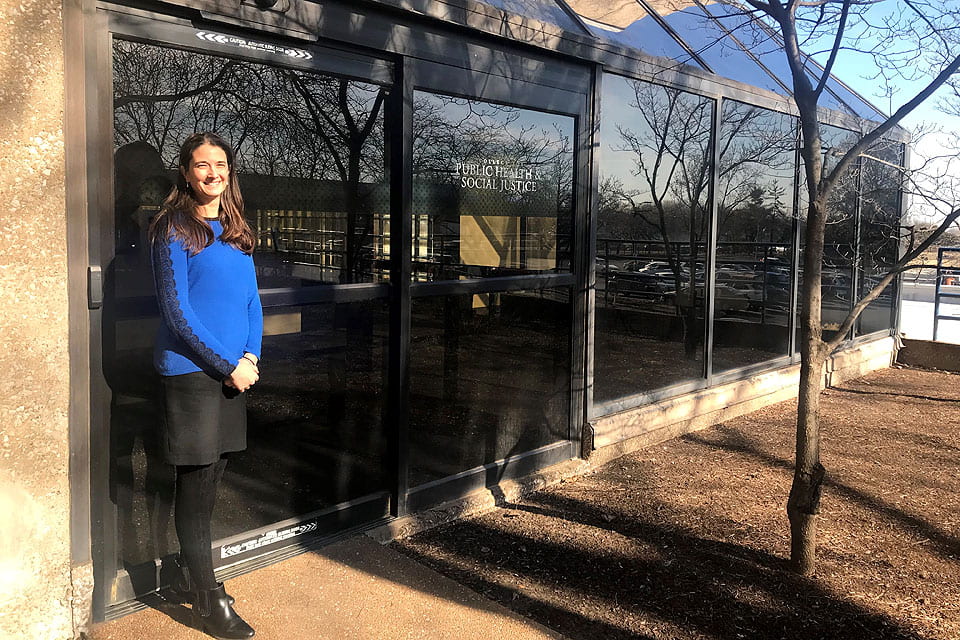SLU Researcher Anne Sebert Kuhlmann to Receive Generate Health STL Award
Maggie Rotermund
Senior Media Relations Specialist
maggie.rotermund@slu.edu
314-977-8018
Reserved for members of the media.
Saint Louis University’s Anne Sebert Kuhlmann, Ph.D., MPH, will receive the Researcher Award from Generate Health STL at its annual Standing Up for Mothers and Babies event on Friday, Oct. 25.
The Generate Health event brings together individuals and organizations who are committed to improving the health of mothers and babies in the St. Louis area.
Sebert Kuhlmann, associate professor of behavioral science and health education at SLU’s College for Public Health and Social Justice and her team, documented the difficulties that low-income people with periods face in accessing sanitary supplies.
Sebert Kuhlmann’s study found that nearly two-thirds of the women her team surveyed and interviewed in St. Louis were unable to afford menstrual hygiene supplies like pads or tampons at some point during the previous year, and 21% of women lacked supplies monthly. Nearly half – 46% – of those surveyed could not afford to buy both food and period-related products during the past year.
In announcing the award, Generate Health acknowledged how her work illustrates a commitment to the community as well as working together as a region.
“After finalizing her study, Dr. Sebert Kuhlmann reached out to local organizations and advocates who could use it to create change. Her work illustrates her commitment to the community, and to working together as a region,” the organization said. “Beyond this study, she has focused her career and research interests on community mobilization, maternal and reproductive health. She has worked with indigenous populations in other countries, and with global organizations such as Dignity Period and Microfinancing Partners for Africa.”
The St. Louis women surveyed by Sebert Kuhlmann’s team reported that a key challenge in accessing period products stems from the products’ high cost and their inability to apply government benefits toward their purchase. Funds from Women, Infants, and Children Program (WIC) or Supplemental Nutrition Assistance Program (SNAP) can’t be used to buy period products.
Her work has influenced action in the community, from church groups to SLU’s Project Period, which started in January to provide students access to menstrual hygiene resources.
In St. Louis, the St. Louis Alliance for Period Supplies is raising awareness, distributing period products through an affiliation with the St. Louis Diaper Bank and advocating for legislative change. Dignity Period has partnered with the Jennings School District on a pilot project providing interested female students with reusable pads. Missouri Appleseed has worked with both the state and the city to get pads and tampons for incarcerated populations provided free of charge.
School districts in New Hampshire and the Boston area, both citing Sebert Kuhlmann’s research, are providing period products in middle and high schools this year.
Sebert Kuhlmann’s work on this topic continues. She, along with colleagues Ellen Barnidge, Ph.D., MPH, associate professor of behavioral science and health education, and Enbal Shacham, Ph.D., associate professor of behavioral science and health education, are conducting a “women’s resources audit” in the City of St. Louis, examining product availability, cost and overall access.
Generate Health will honor four other champions for their contributions to the field of women and infant health. 2019 marks Generate Health STL’s 20th year of service to the community.
Other honorees include:
- Provider Award – Angela Schiefelbein FNP. Schiefelbein has been caring for children, pregnant women, and adults at Affinia Healthcare since 2002 as a family nurse practitioner.
- Community Champion – Monica Wade. Wade runs the Pagedale office for Helping Hand Me Downs.
- Community Champion – Junior League of St. Louis. The organization works to reduce infant mortality in St. Louis specifically through their initiative Day 366: Helping Our Smallest Thrive in Their First Year.
- Provider Award – Barnes-Jewish Hospital and St Louis Children’s Hospital CARE in Pregnancy clinical team. The multidisciplinary team cares for women with opioid use disorder in pregnancy.


















